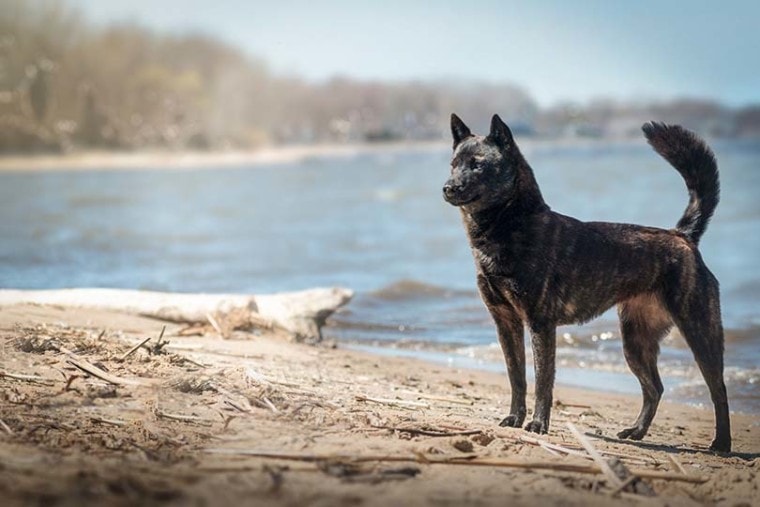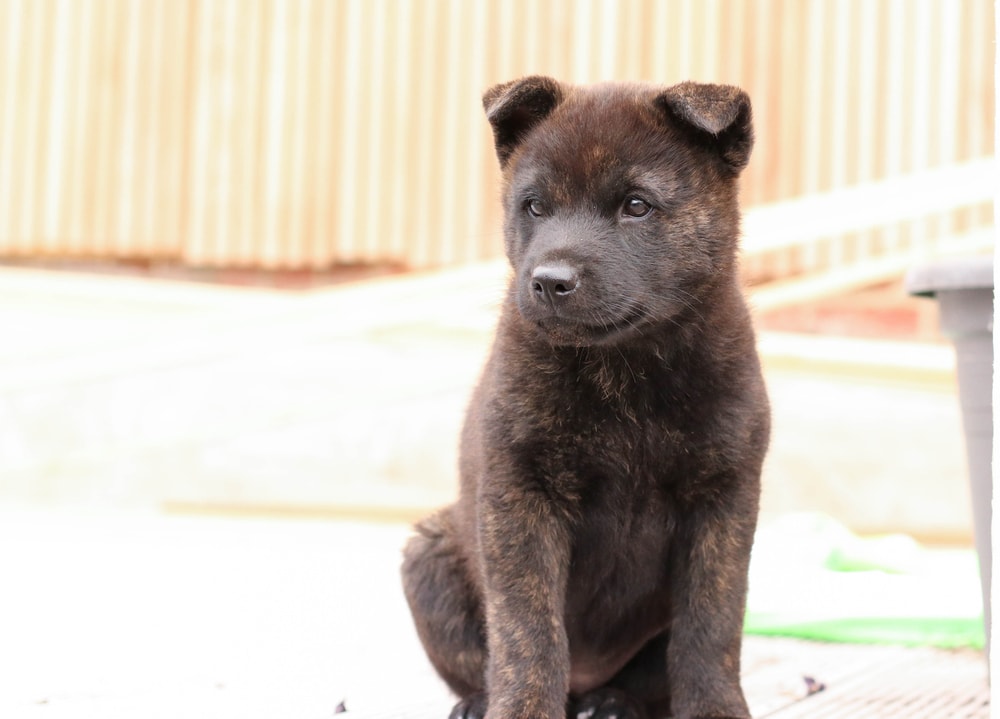
Click Below to Skip Ahead
The Kai Ken is one of the most respected dog breeds in Japan. As one of only six native breeds to receive protection in Japan, these dogs were bred to hunt deer, bear, boar, and the Japanese serow. Their ability to handle the steep mountain terrains made them great for this. This breed became recognized by the Japanese Kennel Club in 1934.
Breed Overview
Height:
19 – 22 inches
Weight:
25 – 55 pounds
Lifespan:
12 – 16 years
Colors:
Black, red, or red and black
Suitable for:
Families with children, singles, and couples with high energy levels
Temperament:
Intelligent, reserved, loyal, alert, and fearless
The Kai Ken made its way to the United States in the 1950s. This is where their loyalty, intelligence, and fearlessness became truly noticeable. By using their normally reserved tendencies, these dogs became great watchdogs while their friendliness made them ideal for families of all sizes.
The Kai Ken is still considered a rare breed of dog. Unique due to its markings that resemble that of a tiger, this dog breed is often known as the Tora Inu or Tiger Dog. Read on below to learn more about the Kai Ken to help you better understand this amazing breed and what they bring to your home.
Kai Ken Characteristics
Kai Ken Puppies

Considering the rarity of a Kai Ken, breeders normally ask quite a bit for these dogs. Keep in mind, it’s always better to buy from a reputable breeder. While the Kai Ken is considered a rare dog breed, you may find yourself on a waiting list. It’s better to keep your place in line to ensure your puppy has been well cared for. Always avoid backyard breeders and dangerous puppy mills when searching for any breed of puppy.
Knowing a bit about a puppy before you bring it home is the best way to ensure they are a great fit with your family. These dogs tend to be very alert and energetic. Be ready to provide plenty of mental and physical stimulation to your Kai Ken to avoid boredom.
Temperament & Intelligence of the Kai Ken
The Kai Ken is considered a highly intelligent breed. This makes it easy to train this dog but its stubbornness can make the process difficult. Training should be done early, especially if you hope to properly socialize your dog. Due to its hunting origins, the Kai Ken will show respect and love to its owner. This will help it on its way to being a great hunting or watchdog.
As a friendly and loving dog, the Kai Ken does great with their family. Keep in mind though, it does require socialization to be completely accepting of strangers. These dogs aren’t happy when left alone for a long time and require lots of love and attention. It is best to keep them as indoor dogs so they can bond with their owners, families, and especially children.
Are These Dogs Good for Families? 👪
Yes, the Kai Ken is great for families. As a reserved pet, this dog does quite well with kids. Their loyal and protective nature will help them form a great relationship with every member of the family. While these dogs love the companionship they will also be highly protective of those they love.
Does This Breed Get Along with Other Pets?
The Kai Ken was bred as a hunting dog. This means it could have prey drive tendencies. When it comes to cats or other small animals, early socialization is a must. This will avoid any unwanted issues within the pet family.
Kai Kens are normally good with other dogs. Like with any dog, socialization at an early age is great. If you have other dogs in the home, training will help ensure they behave socially with one another.
Things to Know When Owning a Kai Ken:
Making sure your Kai Ken is well cared for is the biggest responsibility of any owner. There is more involved than loving, petting, and cuddling your dog. Check out the important tips below to help you properly care for your Kai Ken.
Food & Diet Requirements 🦴
When it comes to dietary needs, every dog is slightly different. Some have higher metabolism while others digest and metabolize their food slower. In most situations, however, a Kai Ken requires at least 1 to 3 cups of extremely high-quality dog food. This amount should be divided between two feedings per day. To keep your dog happier, a healthy breakfast and a balanced dinner will do great.
Exercise 🐕
The Kai Ken is a highly active dog and requires quite a bit of exercise to stay happy and healthy. Considering their origins, these dogs love to run, play, and climb. Fortunately, for owners, this dog doesn’t require the amount of exercise other hunting dogs do. With at least an hour of playtime outside each day and good mental stimulation, your Kai Ken should do well and stay healthy.
Training 🎾
Kai Kens are not difficult to train. With their high levels of intelligence, this dog breed takes to most commands easily. They do require a firm hand and a strong trainer. Kai Kens are known to be quite stubborn so training should be started at an early age to get the most out of their new skills. They respond well to fun and rewarding training sessions.
Grooming ✂️
The Kai Ken is a neat freak in the dog world. This dog breed avoids excess dirt or strong smells. This means they stay fairly clean. It is best to only bathe your Kai Ken when needed to help them retain their natural oils and keep their coats healthy.
The Kai Ken is known to shed. You will have large clumps of hair around your home that will require a bit of cleaning. Brushing your Kai Ken a couple of times weekly will help reduce the amount of shedding especially during their seasonal sheds which happen twice a year.
To keep your Kai Ken’s teeth in good shape, brushing every other day is recommended. Their ears should also be checked weekly and cleaned to help avoid buildup or infections. Trimming your pet’s nails should be done carefully. Always avoid cutting into the blood vessels as this will cause your dog pain. If you don’t feel confident trimming your Kai Ken’s nails, a local groomer or other professional will be able to assist you.
Health and Conditions 🏥
As one of the purest dog breeds, little is known about their congenital health issues. Here’s a look at health conditions that could affect your Kai Ken during their lifetime.
Male vs Female
The biggest difference between male and female Kai Kens is their size. Normally, males stand slightly larger but this difference isn’t overly noticeable. Males may also show signs of being less trusting than their female counterparts and may require a bit more socialization.
3 Little-Known Facts About the Kai Ken
Above we’ve covered a few facts about the Kai Ken, but there is still a lot to learn. Here are three little-known facts to help you learn more about this amazing dog breed.
1. They’re Named After Their Place of Origin
The Kai Ken is believed to have originated from the Kai Province. This area is mountainous, which could be why the Kai Ken adapted for steep mountain climbing. Although the Kai Province has been replaced by the Yamanashi Prefecture, the name lives on with the Kai Ken.
2. It’s Possibly the Purest Dog Breed in Japan
Due to the mountains within their place of origin, the Kai Ken was quite isolated. This kept the Kai Ken from having the opportunity to breed with other dogs and it has evolved into one of the most sought after, rarest, and purest dog breeds in Japan.
3. There Are Two Variations of the Kai Ken
Although mostly recognized as one breed, there are two variations of the Kai Ken. One is considered stockier and looks more like a bear in the face. The other is much leaner and has a fox-like look.
Final Thoughts
The Kai Ken is an all-around amazing animal. As one of the rarest dog breeds, this animal is both majestic and beautiful. Their loyalty and great mannerisms with children make the Kai Ken an ideal pet for families of all sizes. These animals can easily adapt to life inside an apartment, in a large home, or in a peaceful setting with only their owner. If you have time to spend with your Kai Ken, considering their dislike of being alone, this dog can be a great family member. Always remember to show your pet lots of love and ensure their medical and health needs are being met. This will allow you and your Kai Ken to have a long and happy life together.
- You may also be interested in: Eurasier
Featured Image Credit: Autumn Arsenault, Shutterstock






